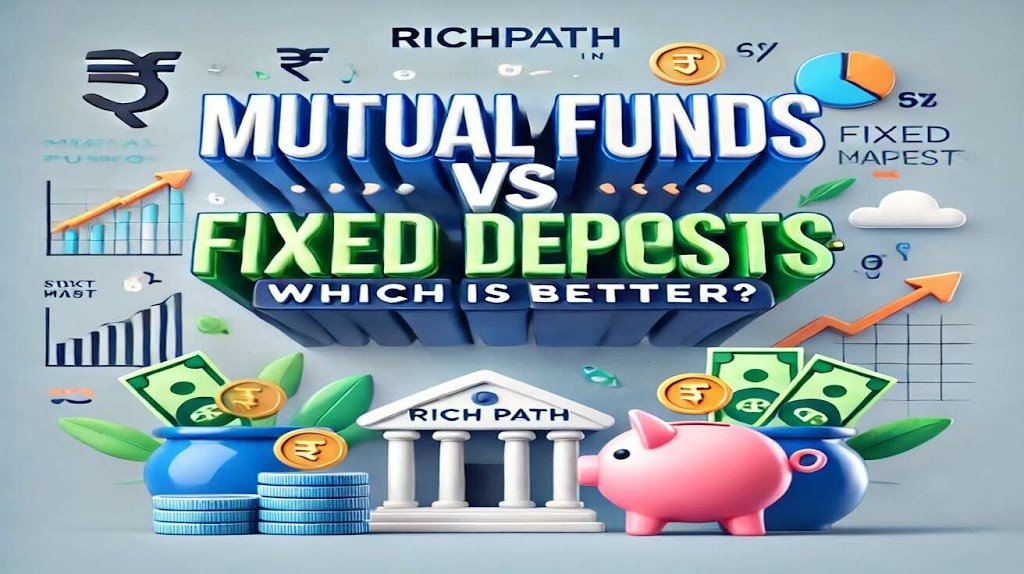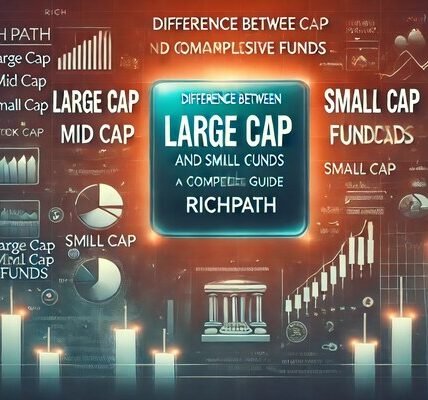Mutual Funds vs. Fixed Deposits: 7 Key Differences to Help You Choose the Better Investment

Introduction- Mutual Funds vs. Fixed Deposits
When it comes to investing, Indians often find themselves torn between traditional options like Fixed Deposits (FDs) and modern avenues like Mutual Funds. Both have unique advantages and drawbacks, making it essential to understand which one aligns better with your financial goals.
In this in-depth article, we’ll explore Mutual Funds vs. Fixed Deposits across 7 key parameters, provide practical Indian examples, and help you decide which investment option is better for you. Whether you’re a risk-averse investor or seeking higher returns, this guide has got you covered.
Don’t forget to visit our website for more insightful articles!
1. Understanding Mutual Funds vs. Fixed Deposits: The Basics
Before diving into the comparison, let’s briefly understand what Mutual Funds and Fixed Deposits are.
- Mutual Funds: A professionally managed investment vehicle that pools money from multiple investors to invest in a diversified portfolio of stocks, bonds, or other securities. The returns depend on the performance of the underlying assets.
- Fixed Deposits: A financial instrument offered by banks and NBFCs where you deposit a lump sum amount for a fixed tenure at a predetermined interest rate. The returns are guaranteed and not market-linked.
2. Returns: Potential vs. Guaranteed or Mutual Funds vs. Fixed Deposits
One of the most significant differences between Mutual Funds vs. Fixed Deposits is the nature of returns.
- Mutual Funds:
- Offer the potential for higher returns, especially equity-based funds, which have historically delivered 12-15% annual returns over the long term. However, these returns are not guaranteed and are subject to market risks.
- Example: An investment of ₹1 lakh in an equity mutual fund over 10 years could grow to ₹3.1 lakhs (assuming a 12% annual return).
- Fixed Deposits:
- Provide guaranteed returns, typically ranging from 5-7% per annum, depending on the bank and tenure. While the returns are lower, they are risk-free and predictable.
- Example: A ₹1 lakh FD at 6.5% interest for 10 years would grow to ₹1.9 lakhs.
✅ Verdict: If you seek higher returns and can tolerate market fluctuations, Mutual Funds are better. For risk-averse investors, FDs are a safer bet.
3. Risk: Market-Linked vs. Risk-Free (Mutual Funds vs. Fixed Deposits)
Risk appetite plays a crucial role in choosing between Mutual Funds vs. Fixed Deposits.
- Mutual Funds:
- Subject to market risks. Equity funds, for instance, can experience significant fluctuations in value. However, debt funds are relatively safer.
- Example: During the COVID-19 market crash, many equity funds saw a drop of 20-30%, but they recovered strongly later.
- Fixed Deposits:
- One of the safest investment options, as they are not affected by market conditions. Your principal and interest are guaranteed.
✅ Verdict: If you’re risk-averse, FDs are better. If you can take calculated risks, Mutual Funds offer better rewards.
4. Liquidity: Flexibility vs. Lock-In Period
- Mutual Funds:
- Most are highly liquid, allowing you to redeem your investment anytime (except ELSS funds, which have a 3-year lock-in). However, exiting during a market downturn may result in losses.
- Example: You can redeem equity mutual fund units within 1-2 working days.
- Fixed Deposits:
- Come with a fixed tenure, and premature withdrawals attract penalties. However, some banks offer flexible FDs with partial withdrawal options.
- Example: Breaking an FD before maturity may reduce your interest rate from 6.5% to 4%.
✅ Verdict: Mutual Funds offer better liquidity, while FDs are more rigid but predictable.
5. Tax Implications: Equity vs. Debt Taxation
Taxation is a crucial aspect of Mutual Funds vs. Fixed Deposits.
- Mutual Funds:
- Equity Funds: Long-term capital gains (LTCG) above ₹1 lakh are taxed at 10%. Short-term gains are taxed at 15%.
- Debt Funds: LTCG is taxed at 20% with indexation, while short-term gains are added to your income and taxed as per your tax slab.
- Fixed Deposits:
- Fully taxable as per your income tax slab.
- TDS is deducted if the interest exceeds ₹40,000 (₹50,000 for senior citizens).
✅ Verdict: Mutual Funds, especially equity funds, offer better tax efficiency than FDs.
6. Inflation: Beating Inflation vs. Falling Short
- Mutual Funds:
- Equity Mutual Funds have the potential to outpace inflation, which averages around 6% in India.
- Example: A 12% return on equity funds beats inflation, providing a real return of 6%.
- Fixed Deposits:
- FDs barely keep up with inflation, offering minimal real returns.
- Example: A 6.5% FD return provides a real return of just 0.5% after inflation.
✅ Verdict: Mutual Funds are better suited for beating inflation.
7. Investment Horizon: Short-Term vs. Long-Term
- Mutual Funds:
- Best for long-term goals (5+ years).
- Example: Investing for a child’s education 15 years away can yield substantial returns.
- Fixed Deposits:
- Best for short to medium-term goals where capital preservation is a priority.
- Example: Parking money in an FD ensures safety and liquidity.
✅ Verdict: Mutual Funds are better for long-term goals, while FDs are ideal for short-term needs.
Conclusion: Mutual Funds vs. Fixed Deposits – Which One Should You Choose?
The choice between Mutual Funds vs. Fixed Deposits depends on your financial goals, risk appetite, and investment horizon.
- Choose Mutual Funds if you seek higher returns and can handle market risks.
- Choose Fixed Deposits if you prioritize safety, predictability, and short-term goals.
For a balanced portfolio, consider combining both. Allocate some money to FDs for safety and liquidity while investing in Mutual Funds for long-term wealth creation.
Like This Article? Share & Visit Our Website!
Was this article helpful? Share it with your friends and family to help them make informed investment decisions.
Read More-
How Long-Term Investments Can Secure Your Retirement
📢 For more expert insights on Mutual Funds, Fixed Deposits, and investing, visit Rich Path! 🚀
Have questions? Comment below, and we’ll be happy to help!



